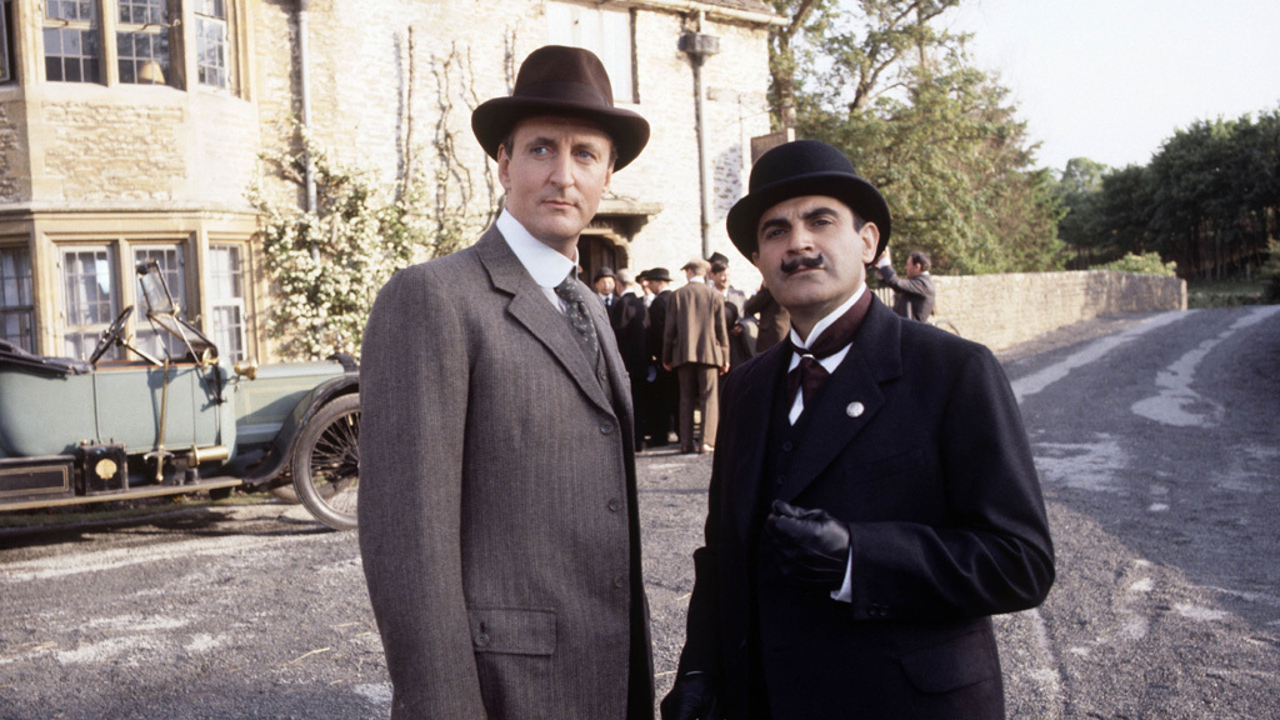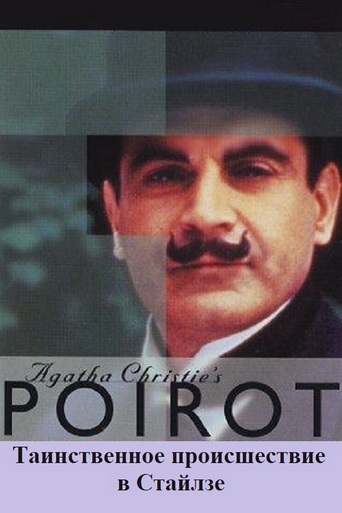Fluentiama
Perfect cast and a good story
Kidskycom
It's funny watching the elements come together in this complicated scam. On one hand, the set-up isn't quite as complex as it seems, but there's an easy sense of fun in every exchange.
Orla Zuniga
It is interesting even when nothing much happens, which is for most of its 3-hour running time. Read full review
Bessie Smyth
Great story, amazing characters, superb action, enthralling cinematography. Yes, this is something I am glad I spent money on.
SimonJack
"The Mysterious Affair at Styles" was the first novel written by Agatha Christie. As such, it was her first mystery of 80 that she would write in her lifetime. And, it introduces her most famous and appreciated detective, Hercule Poirot. Along, with Poirot, it introduces Inspector (later, chief inspector) Japp of Scotland Yard, and Hastings (first, lieutenant, and later, captain) who would become a sleuthing companion of Poirot in many of his adventures. Christie was just 26 years old when she penned her first story in 1916. It was serialized in The Times of London, and first published in book form in 1920 in America and 1921 in England. This movie is based on that novel. The films of this television series were not produced in the sequence that the stories appeared. But in this series, which began in the late 1980s, David Suchet would set the standard for Poirot's character. Several actors had played Poirot in movies that were made intermittently over the previous five decades plus. Now, Christie's public and fans would finally have a character who was every bit Poirot as created by the author. The setting for this film is England in 1920, in the midst of the First World War. Poirot has fled his native Belgium that, he rues, has been overrun by the "Boche." But it is the beginning of an illustrious career in England in which Poirot will delight readers and audiences of all ages for ages, as the best super sleuth of all time. The various British producers and writers who worked on this series over three decades did superb work. And the cast, from the exceptional regular leads and support, to the many different story characters (almost all are "suspects") make the entire series outstanding entertainment. This introduction of Poirot, Hastings and Japp has all the beguiling intrigue that audiences have come to expect and look forward to from Christie and Poirot. Here are some favorite lines from this film. For more dialog, see the Quotes section under this IMDb web page of the movie. Hercule Poirot, "You have a good grip on this affair, Hastings." Lieutenant Hastings, "Grasp." Poirot, "Yes?"Hercule Poirot, "We must be so intelligent that he does not suspect us of being intelligent at all." Lieutenant Hastings, "Absolutely..." Poirot, "And there you will be invaluable, mon ami."Madam Evie Howard, "May I ask what's going on?" Inspector Japp, "You may ask, madam. If you get any reply, you might let me know."Lieutenant Hastings, "I shall never understand women." Hercule Poirot, "... Perhaps one day, when this terrible war is ended, we shall work again together, huh? And Poirot will explain all to you."
grantss
World War 1 and British Army officer Arthur Hastings is recuperating in a quiet manor in the English countryside. When a woman is murdered in the household, Hastings enlists the help of an old friend to solve the mystery - Hercule Poirot.Intriguing and quite nostalgic. This is the mystery that cemented the Poirot-Hastings partnership. So quite an historic feel to it.
bob the moo
Although IMDb lists this feature length outing as the first episode of the third season, it is actually a stand-alone episode which was made to mark 100 years since the birth of Christie. I know this because early doors I did have to do some Googling to understand the context because the film is the very first book where Poirot makes an appearance and as it fit into the flow of the season. The plot sees Hastings having only previously met Poirot once but by chance reunited with him as the little Belgian and others have temporarily been granted entry into the UK to escape the war. Whenever the residence where Hastings is staying experiences a death, he suggests they involve Poirot to help with the investigation.The change in time appears to have had other impacts too because this special is not quite as good as the previous two seasons had been. The change in dynamic and relationship is an impact but it is not particularly negative in the grand scheme of things but it does jar a little when watching in the context of the previous episodes; Hastings is a darker character in the wake of the war and Poirot's relationship with him is perhaps too superficial (as one would expect) so the humor between them is not as evident. The plot is engaging but not all of it makes sense and as part of filling out two hours, there is a lot more in the way of red herrings than normal which by definition means that the mystery becomes less accessible and less straightforward. These factors are small things though because, although clearly different from the episodes before, the film still works very well and delivers in the ways it normally does – even if that is not quite as well as we are used to.The cast remain very good although understandably there is some restrictions on their characters as we "get the gang together" as it were. Suchet is as good as ever even in a younger appearance; I liked that he retained the character but made it work a few steps earlier in the line – for example his fussy, irritable streak is more gently shown with an attention to detail. Fraser has less of a comedic role, which is a shame as he is very good at that, but he does make for more of a rounded character. Jackson is solid in support as usual but is less used. The supporting cast are generally pretty good although in a way I went for them less because to me they were part of the "fuller" film feel and thus worked a little against the fresher, more accessible plots than I had enjoyed of late.The Mysterious Affair at Styles is still a very enjoyable film that is a nice addition to the episodes even if it clunks a little bit against the flow. The essence is still there even if it must be said the longer running time and the change in the dynamics does rather reduce the fresh humor of the episodes and how accessible they were.
dbdumonteil
Styles manor was certainly a place dear to the writer,for her first "Poirot" and her last one ("Curtain-Poirot's last case) in which the sleuth dies both take place there.That said "Styles" is not one of Poirot's best cases,and Christie wrote at least twenty books which are superior to it.Interest lies somewhere else.This is the novel which tells us why Belgian Poirot wound up in fair England -which he somewhat despised- and it does not forget the historical background ,with a fine depiction of the WW1 years.If my memory serves me well,Christie wrote the book cause she wanted to take up her sister's challenge: a story where you could never guess whodunit..

